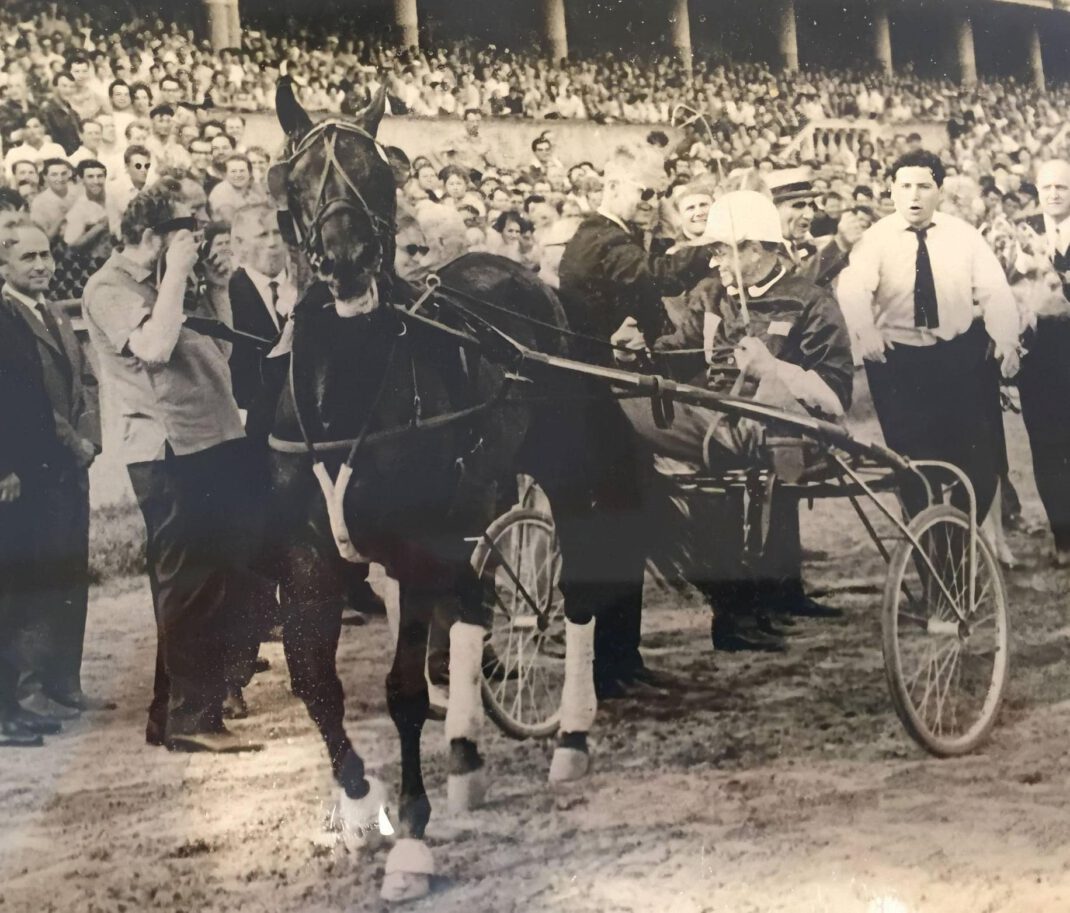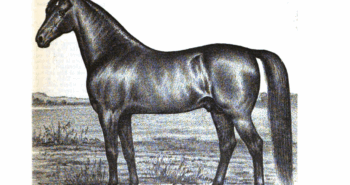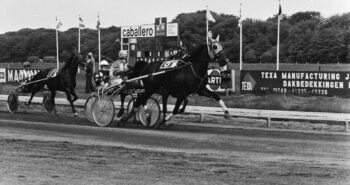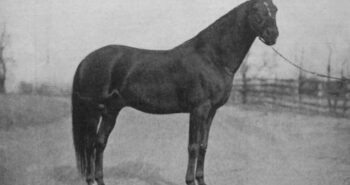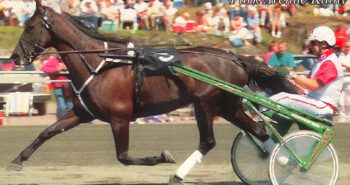He was the tiny American with a heart of gold who became a star in the Soviet Union. The pioneering trio of Apex Hanover, Bill Fleming and Rowland Wade took on the Soviet stars at their home in Moscow in the 60s. After overcoming unfair tactics by the Soviet drivers, the US trio won the hearts and minds of the home crowd. Although little Apex Hanover (150 cms/14,3 hands) won the Arden Downs and George Wilkes Stakes as a 2-year-old in 1961, there was very little to indicate that this $18,000 yearling purchase would later enter the world stage.
Trained by Del Miller and usually driven by Miller’s chief assistant Jimmy Arthur, he was one of the better in his crop. He set a track record at Arden, when winning the Arden Downs, in 2:06 (1.18,3) as a 2-year-old, but was still a bit behind the best in the crop – like Impish, who had set a 1:58.3 (1.13,7) world record as a 2-year-old. Apex did not have a great 3-year-old season and after he finished last in the 9-horse Historic Dickerson Trot on July 3 at Goshen, it was obvious Apex would not be a factor in the bigger races later that year. What held him back, though, was problems with his hind legs, a problem which led to him not even starting in the Hambletonian or Kentucky Futurity.
Moved to Bill Fleming’s stable, Apex improved steadily as a 4-year-old, winning several conditioning and free-for-allers and when meeting the best aged trotters he held his own nicely. In the Harness Tracks of America Trot (HTA Trot) at Northville Downs he finished third behind AC’s Viking and Tercel but ahead of such a good trotter as Sprite Rodney. In the next leg of the HTA Trot at Scioto Downs he finished second to Pro Hanover but ahead of previous year’s Hambletonian winner AC’s Viking. Toward the end of the year, in November 1963, Roy Cleveland disposed of his stock at the Harrisburg auction. According to a note in the Evening Standard on Nov 6, “the top price of $22,000 was paid for Apex Hanover by Tom Gillen, Carbondale, PA”. But for whatever reason the sale never went through, and the tiny son of Star’s Pride remained in Roy Cleveland’s hands.
An invitation to go east
In 1964 he remained one of the better aged trotters. Apex Hanover’s story took off in July 1964 when he and Spindletop Joe, another US trotter, were invited to the Soviet Union to race in a 3-heat-race, the International Peace Prize. Spindletop Joe did not start in Moscow, and Apex Hanover was the only one to defend US colors in the communist capital. US-owned horses had raced in Russia prior to the Communist takeover but that was before World War I, and Apex Hanover thus became the first US-owned horses racing in the Soviet Union. The journey to Moscow was an arduous one: on July 20, Apex Hanover flew from Kennedy Airport to Frankfurt, Germany, before changing planes and continuing to Berlin. There the travel party changed to a train. They traveled from Berlin through Warsaw to Moscow in a freight car, arriving on July 26 – a mere six days later (!)
Driven by Billy Fleming, Apex Hanover won the first heat rather comfortably and finished second in the other two heats in Moscow. The winner was determined on the best overall time for the two fastest of the three heats. Apex Hanover’s aggregate time of 4.09.8 was sufficient to defeat the Russian trotter Legion – who finished second with 4.10.4 – and a solid portion of help as described below – to win the overall trophy in front of a crowd of 25 000 and a grandstand box crowded with US Embassy persons.
Although Apex was the big favorite, victory was not a foregone conclusion. Because of his career earnings he was given a handicap of 25 meters (27 yards). The track was also much harder than he was used to – it was described by Roy Cleveland as having “exactly the same consistency as Fifth Avenue, New York City on a hot summer afternoon” – and not as well prepared either (several observers described the track as “wavy”). Finally he had to contend with what Fleming diplomatically called “traffic problems.” That was a very diplomatic phrasing, however, as the Soviet drivers intentionally tried to block him and help their own horse Legion to win. In the third heat, three Soviet competitors spread across the track while Legion was several lengths ahead. Although Apex managed to get around the blocking trio, this made it impossible to win the heat.
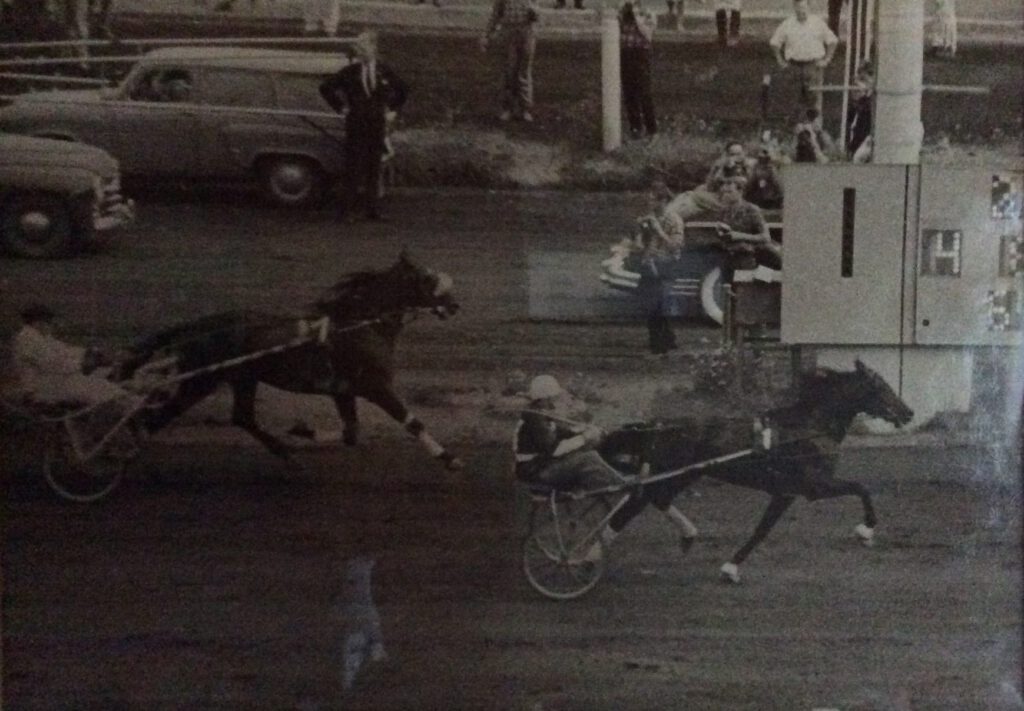
During the winning ceremony Apex Hanover, Fleming and Wade received a standing ovation from the crowd. Several Russians would later tell both Cleveland and Fleming that they liked how the US horse had won it, beating opponents that were colluding against him. Fleming would later admit to being both surprised, but also really happy and proud. This was not the only time on the trip, either. On the trip Fleming had visited the trotting museum in Moscow, the very first picture he saw was that of his late father, Vic Fleming, with Billy Direct.
An unusual deal
Roy Cleveland, the owner of Apex Hanover, said he had never encountered such intentional blocking tactics before and admitted his horse was lucky to get first place under the circumstances. Cleveland won 5,000 rubles, approximately $5,500, but, in a bizarre twist, he could not take the money out of the country because of Soviet currency regulations at the time. But Cleveland knew what do to, claiming he would spend all of the money on “lots of champagne, caviar and vodka.”
Though the winning margin wasn’t very big, impressed Russians knew they had witnessed a great trotter. The day after the race Evgeny Dolmatov, head of the Soviet trotting association, asked Leo Doobin, the General Manager of Yonkers Raceway, who was part of the entourage, Bill Fleming, and Roy Cleveland to have dinner with him and Peter Paryshev, chief of Soviet stud farms. During the dinner, the Russians asked if Cleveland would consider a swap of four Russian yearlings for Apex Hanover. Mr Cleveland responded that he thought seven of yearlings would be a fairer swap. However, the aforementioned currency regulations posed a problem: Cleveland could not be paid in cash, or more specifically, he could not bring any Soviet cash out of the country. After some negotiations a rather unique deal was worked out: the Russians would buy Apex Hanover in exchange for seven Russian horses and as much caviar and cut glass as Roy Cleveland could carry home from Moscow. Part of the deal was also a promise from Cleveland and Fleming to the Soviets that the Russian horses would be trained by American standards and raced in the US, and after the careers the mares would be bred to American stallions.
The last aspect of the deal gave Cleveland the right to send horsemen there to pick out the youngsters. Cleveland asked Lawrence Sheppard to travel past the Iron Curtain. In the Aug 26, 1964, Harness Horse there was an article “Lawrence Sheppard To Visit Russia” which informed that “Lawrence Sheppard and his daughter Mrs. Patricia S. Williams will go to Russia around the 9th of September to pick the seven Russian-bred yearlings that will be sent to this country. Roy Cleveland, on his recent trip to the Soviet Union, traded Apex Hanover for the yearlings with the Russian government giving him the right to send horsemen there to pick out the youngsters. They will include both colts and fillies, and will be shipped to Montreal with the USSR paying the costs up to that point.”
Cleveland kept one of the “Soviet Seven”, a mare called Gramota, while the other six was given the prominent figures in US trotting:
- Levkoy was given to Lawrence B Sheppard
- Blizky was given to Bill Fleming
- Klyazma was given to Martin Tannenbaum
- Lux was given to Max Hempt
- Lipa was given to Delvin Miller
- Blokirovka was given to Castleton Farm
- Gramota was kept by Roy Cleveland
As it turned out, the Soviet horses were nowhere near the required level to be trained the US way and nobody even took a record or earned a single dime. Blokirovka and Gramota were both bred to US stallions but with little success. Blokirovka’s son Gold Coaster (by Spectator) took a 2:08.4 (1.20,0) record and earned $6,269. Gramota produced a few that made a money, though very little. One was even a pacer, Pennsy Dream ($174). The second horse in the list above found by far the most fame, though. Blizky, or more commonly Blitzky, became a famous outrider at Brandywine.
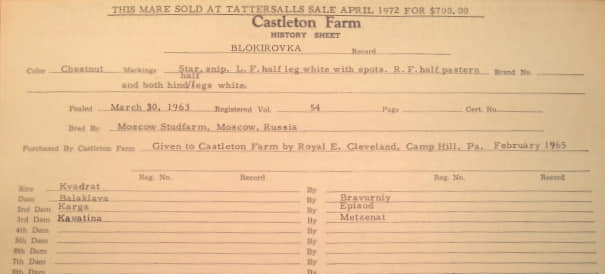
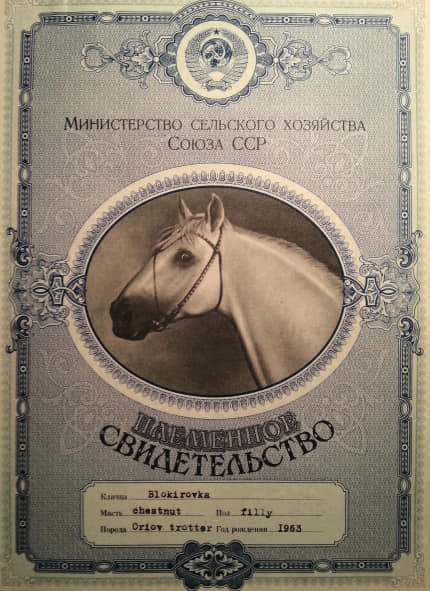
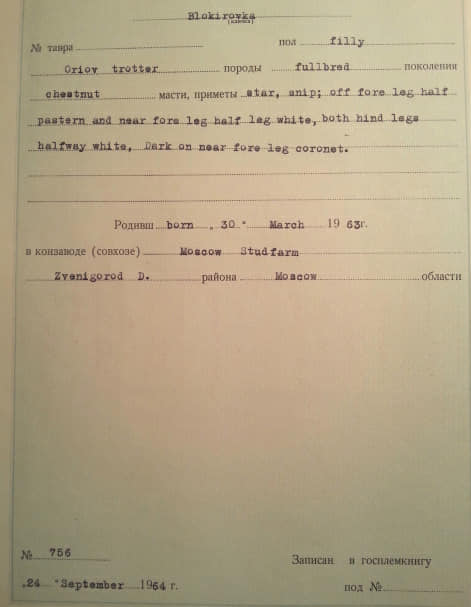
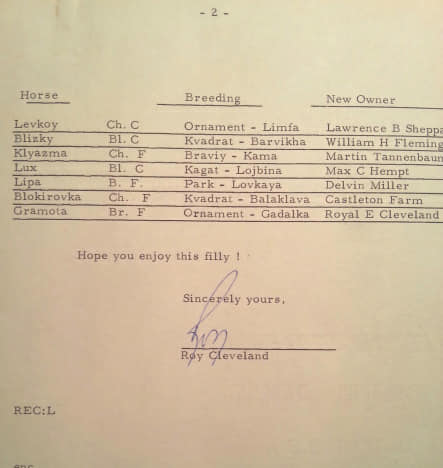
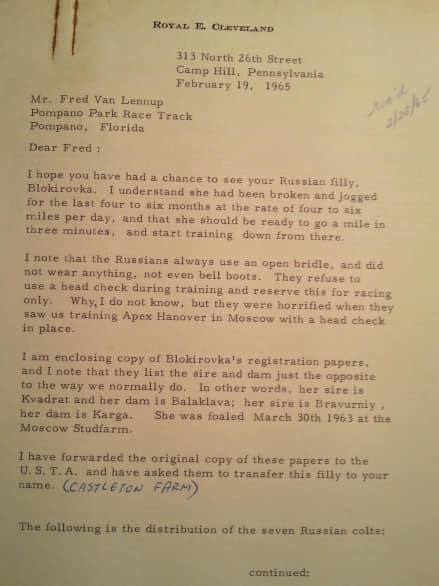
Becoming a European star
In the Soviet Union, Apex Hanover officially became owned by the Prilepskij stud farm and put in the training of 29-year-old Maria Burdova. Despite her young age, Maria Burdova was already established as one of the finest trainers and drivers in the Soviet Union. Just a month prior to the purchase she had won the Russian Trotting Derby with Kovyl and was highly regarded in the Communist superpower. Apex Hanover and Burdova enjoyed great success both in the Soviet Union and abroad, particularly on French, but also on Swedish, tracks. Apex thrived in Europe and even though he was a very fast sprinter he excelled even more on longer distances.
He finished fifth in the 1965 Prix d’Amerique and was second in 1966 Prix de France. His definitive breakthrough, if he needed any, came when he won the 1965 Prix de Paris, and he was also second in the 1967 edition of the race. The Prix de Paris win was particularly impressive as the beaten trotters included stars such as Elaine Rodney, Elma, Ozo and Oscar RL. While Burdova usually drove the horse, she always had Pavel Litvin drive in France – but that was not a voluntary decision Interestingly, women were not allowed to drive in French sulky races. The French association deemed it inappropriate for a woman to sit with her legs spread. Unofficially some claim the French were doing everything in their power to help Ozo to a win that year, including forcing a driver’s change on Apex Hanover. Regardless of the actual reason, a rather angry Burdova uttered that “I thought French women had been liberated” – but her comments fell on deaf ears.
Apex also finished third in the 1965 Preis der Besten, one of the top German races, won by Oscar RL. A trip to Sweden “only” produced a sixth-place finish in the Elitlopp although a start at the southern Jägersro track produced a 2:05.4 (1.18,2) win, the track’s fastest that year. Apex also traveled back to the US on several occasions. In 1966 the duo won an invitational International Trot at Batavia Down.
A special situation involving Burdova and Apex Hanover took place on International Workers’ Day, May 1, 1966, at Charlottenlund, Denmark. In the race Majpokalen, the May Trophy, the Danish trotter Earl Søvang initially took the lead but broke and interfered with several opponents. One of these was Apex Hanover and Maria, she had to bring her horse to an near-standstill to avoid crashing into another horse. The same thing happened to another horse, Hideal, and to make matters worse the wheels of two trotters then got entangled. Though he was the one who was responsible for the carnage behind him, Earl Søvang caught up to the leading Firebird on the finish line and won in 1.19,8 (2:08.2). Burdova was, quite understandably, heartbroken and drove right to the stable, locked the doors and cried loudly. What exactly happened backstage is unknown but one can only guess … in the end the organizers put on an “invitational trot” at the end of the other races that day. Only Apex Hanover, Hideal and Earl Søvang took part, and without any interference the Soviet trotter had no problems showing his true colors winning in a very impressive 1.16,5 ( 2:03). Behind him, Hideal was second – in 1.21,8 (2:11.3).
Upon retirement Apex Hanover stood stud at the Prilepskij stud. He was bred to both Orlov broodmares and trotting mares with standardbred pedigrees. Because of his speed and type he was used on mostly bigger broodmares and he produced well. Apex Hanover only lived to the tender age of 13, however, as he had to be was euthanized in 1972 because of a leg fracture. He was thus limited to only 149 get in the Soviet studbook. Apex Hanover’s long-term studbook impact was limited, but he will always be remembered as the first US-owned trotter to win a race in the Soviet Union – and the first Soviet-owned trotter to win a Group 1-race in France.
Apex Hanover
Brown colt born in Hanover, PA in 1959. Died in the Soviet Union in Dec 1971 .
Star’s Pride – Alda Scott (Scotland)
1.16,5 / 2:03 – $147,433 + European earnings
Breeder: Hanover Shoe Farm
Owners: Hanover Shoe Farm – Roy Cleveland – Prilepskij state farm
Trainers: Delvin Miller, Bill Fleming and Maria Burdova
Drivers: Delvin Miller, Jimmy Arthur, Bill Fleming, Maria Burdova and Pavel Litvin.
Groom: Rowland Wade and others

